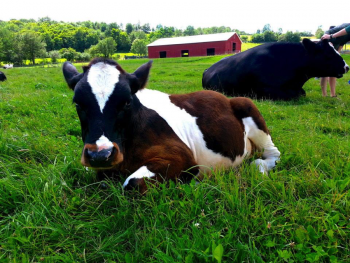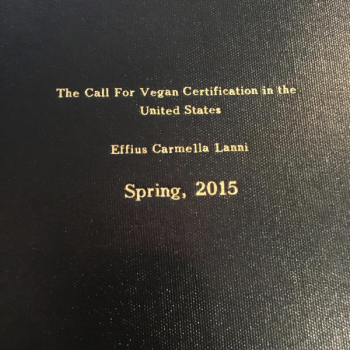On Wednesday, May 20, 2015, I officially earned my Master’s degree from New York University. It was one of the most rewarding experience of my life. It gave me the opportunity to connect my passion to my studies, in ways I didn’t think were possible.

My original research social media influence on e-commerce shopping patterns. I was less than two weeks away from submitting my initial proposal when I took a trip to Farm Sanctuary in Watkins Glen, NY and fell in love…hard…with Michael the calf. When I returned, I emailed my then professor to share that I had an epiphany and wanted to change my topic. I wouldn’t have felt “right,” if I didn’t include veganism in my study. His response was “Go with where your passion lies.” After those 2 weeks, I presented my class with my new proposal along with a photo of Michael the calf. That would begin a crazy adventure of challenges, debates, analysis, tears, laughter, stacks of notes and sleepless nights.
With the help of my thesis supervisor, I shifted my topic away from social media to explore how vegans felt about government intervention in vegan product certification. I would see social media posts from people complaining about products not being labeling as vegan, yet not understanding what’s involved in certification processes and liability. I posed a seemingly simple question to a group: “Do you think the government should certify vegan products?” The answers were a bit puzzling:
- “If it says ‘vegan’ on the label, it’s good enough for me!”
- “The government lies and would want to profit off of veganism”
- “I can just read the label and tell if it’s vegan”
- “If you eat a whole foods, plant-based diet, you don’t need to be concerned about certification”
- “I trust the brands I buy.”
If this was how vegans felt, then why were these same people upset when a product would not be labeled as vegan?
The United States doesn’t have standards to define vegan products at this time. Neither the FDA nor the USDA seems to have approached the subject for food or non-edible items. While vegans account for 1% of the U.S. populations, there is a demand for companies to reveal if their products are vegan. There are non-profits and private companies who conduct their own certification with disclosure of procedure being varied. However, if people don’t know what to find and if the certification processes are different, then how can we trust what’s labeled as vegan? Can we trust the government to do that for us?
To answer these questions, I examined vegan self-identification and the influence of health and ethics on consumer trust. I surveyed 150 participants by posing questions on their perceptions of vegans, current non-profit and private product certification and shopping behavior. I proposed a government-regulated certification process with a standardized definition of veganism to measure consumer trust and support for government intervention in vegan certification.
The survey results and findings were great. The analysis revealed a number of commonalities amongst the vegans in this study:
- They consider themselves to be highly ethical yet health-conscious
- They are detail-oriented consumers who seek out certification on labeling and are concerned about the contents of the products they buy
- They would like to see some government intervention, but would require great detail before giving support to a government-regulated certification process
- Many were comfortable if the government partnered with an existing non-profit certifier to set definitive standards and create an application process with consistent regulatory guidelines
- They could see there being government regulations for vegan products in the next 10-15 years
Based on the study, there is a need for it for government involvement in the vegan certification process. What would fill that need is yet to be determined. While there are academic studies on perceptions and acceptance of veganism, and vegan nutrition, there needs to be more on consumerism. Why? Because we each have a voice when it comes to how we spend our money.

So what’s next for me now that I’ve earned my Master’s degree? I’m still trying to figure that out. I want to explore this topic further, but school can surely wipe you out! My thesis supervisor advised me not to read my thesis again for six months. That may be a good thing. If do sneak a peek, I might do something crazy…like begin the pursuit of a Ph.D.
 Carmella Lanni-Giardina, VLCE is a graduate of New York University with a M.S. degree in Management & Systems. She shares her first name “Effius” with her newly plant-based mother. Carmella is one-half of The Food Duo (thefoodduo.com) with husband, VLCE Carlo Giardina. She co-hosts the semi-weekly Twitter chat, #VeganFoodChat (twitter.com/veganfoodchat). She loves all things digital, but not as much as her cat kids, Mozzer and Connie.
Carmella Lanni-Giardina, VLCE is a graduate of New York University with a M.S. degree in Management & Systems. She shares her first name “Effius” with her newly plant-based mother. Carmella is one-half of The Food Duo (thefoodduo.com) with husband, VLCE Carlo Giardina. She co-hosts the semi-weekly Twitter chat, #VeganFoodChat (twitter.com/veganfoodchat). She loves all things digital, but not as much as her cat kids, Mozzer and Connie.


Congratulations Carmella!
Russell